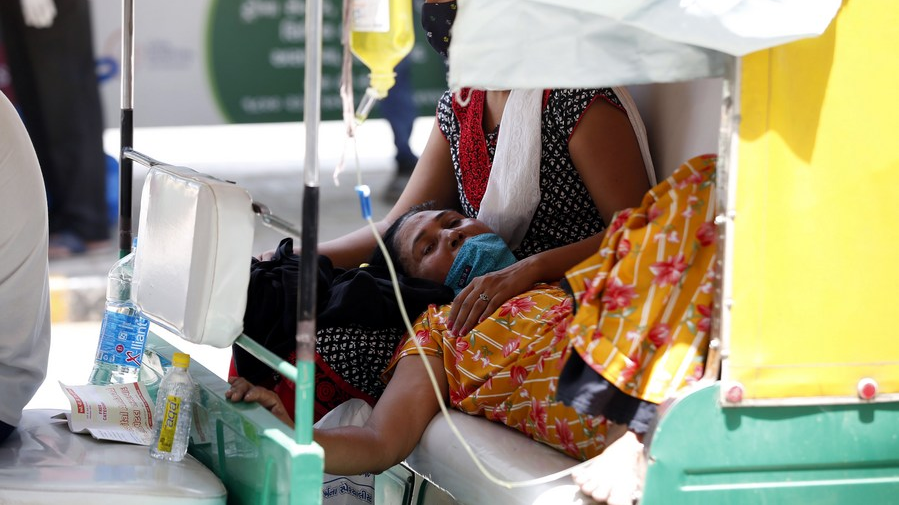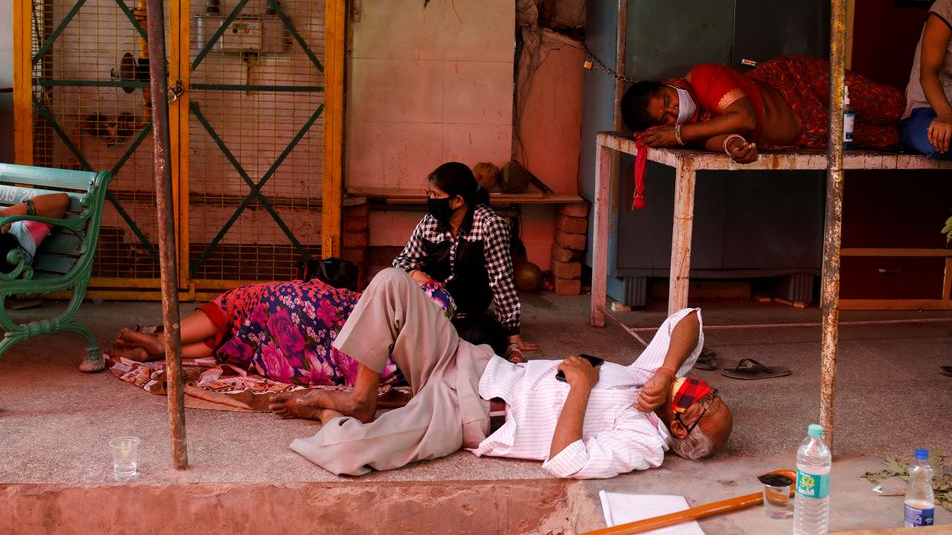
The peak of the second coronavirus wave in India will come around mid-May (around 20 days from now) with active cases reaching around 36 lakhs, SBI Research in its latest report has said. /Xinhua
The peak of the second coronavirus wave in India will come around mid-May (around 20 days from now) with active cases reaching around 36 lakhs, SBI Research in its latest report has said. /Xinhua
Editor's note: Maitreya Bhakal is an Indian commentator who writes about China, India, U.S. and global issues. The article reflects the author's opinions and not necessarily the views of CGTN.
"Our first obligation is to Americans," said the U.S. State Department spokesperson. The response was to a question regarding U.S. medicinal exports to India due to the latter's deadly second wave of COVID-19. America flatly refused at first, claiming – to the surprise of many Americans – that its first duty was to save American lives, which caused many Americans to wonder where this "obligation" went when half a million of them were dying from the same disease.
Taking sides
The other category to be surprised was the creatures known as "media pundits" who keep shilling for the Quad – a motley assortment of India, U.S., Japan and Australia. The grouping seems to be directed towards countering China's rise by creating a hodgepodge of "democracies."
India is a useful nation for America. It provides a large market for consumer products and weapons, not to mention a source of cheap labor for outsourced IT operations. But perhaps the most important use of India is its potential as a hedge against China. Fortunately for the U.S., India has its own issues with China, including a decades-old border dispute that America has been all too happy to exploit.
Yet, America's efforts to turn India into a comprador state have achieved limited successes. Much to America's chagrin, India has repeatedly rejected being part of a formal alliance. As India's Minister of External Affairs S. Jaishankar once put it "Sure, we have taken sides. I have taken my side.”
But that hasn't stopped America from trying. It has repeatedly indulged India and frequently attempted to prop it up as a democratic foil to China (India isn't amused, and usually dislikes such public displays of affection). America has long flaunted India as a key U.S. ally as well as the "next China" for decades via its media propaganda organs, showing it off like a trophy wife (and with as much objectification).
America first, Quad last
The U.S. regime boasted about expanding vaccine manufacturing in India as part of the Quad initiative. The strategy was obvious: to use India, the world's largest vaccine manufacturer, to counter the "vaccine diplomacy" of China, the nation that has supplied more COVID-19 vaccines to the world than any other nation.
When India's second wave hit, many countries offered help and emergency medicinal supplies, including Pakistan and China. America, meanwhile, staunchly refused at first. When the time came to step up and prove its commitment, it snubbed India.

People with breathing problems due to COVID-19 wait to receive oxygen support for free at a Gurudwara (Sikh temple) in Ghaziabad, India, April 27, 2021. /Reuters
People with breathing problems due to COVID-19 wait to receive oxygen support for free at a Gurudwara (Sikh temple) in Ghaziabad, India, April 27, 2021. /Reuters
Only U.S. propagandists were surprised. For decades, they had portrayed America as a responsible superpower, the Shining City in the Hill that helps nations in need. A country that, to use Biden's words, led by the power of its example and not the example of its power. A nation that does not bully other nations like China apparently does and selflessly comes to their aid.
As usual, U.S. strategy was as simple as it was evil: refuse to help other countries, and when China or Russia does so, insult them by portraying their assistance solely a geopolitical ploy for global influence. If the U.S. regime could be so oblivious to the deaths of hundreds of thousands of its own people due to the pandemic, it was hardly about to start caring about people on the other side of the globe, especially those whose race was not the one America preferred.
Instead, the regime falsely sought to create the impression that exporting vaccines and raw materials would come at the cost of vaccinating its own people. Yet, the two were not mutually exclusive. America has hoarded enough vaccines to vaccinate its population three times over.
The U.S. U-turn
This stubborn refusal came under extreme criticism, even from the regime's own cronies. The snub to a key Asian partner was so shocking, especially one that had helped America during its time of need last year, that the move was opposed even by those who support America's brutal wars and bombings that kill millions.
Eventually, America gave in to the pressure. Even the evilest nation on Earth can only take so much.
Yet, the delayed U-turn was not the result of some soul-searching or because the regime had suddenly grown a heart. It was merely a belated attempt to salvage its reputation.
Yet, such geopolitical gestures – or lack thereof – will not be easily forgotten. It is unlikely that America's initial instinctive reaction – a treacherous backstabbing – will be forgotten soon. It will likely make India more realistic in its expectations of those who pretend to be friends. After all, only those who are behind you can stab you in the back.
(If you want to contribute and have specific expertise, please contact us at opinions@cgtn.com.)

